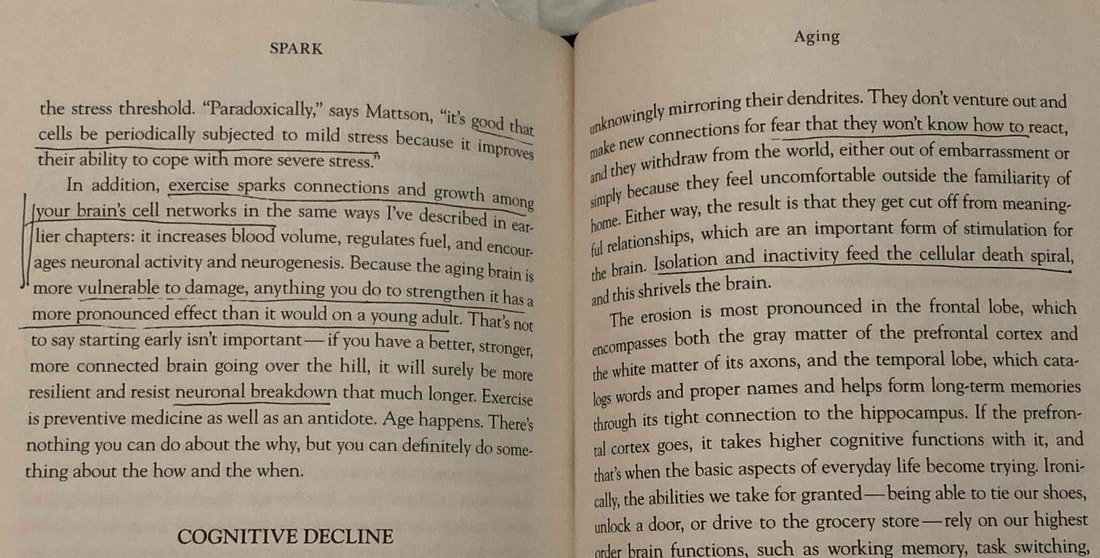|
SEARCH My Blog (Opens in new tab)
Building pathways around ingrained reactions
I've always been interested in how exercise might help our brain. That's why I became excited when I got a copy of Spark, by John Ratey. It's been around since 2008, yet many of its findings are still not widely know.
The subtitle of the book is "The Revolutionary New Science Of Exercise And The Brain". The book is now heavily underlined. I like to underline key passages in books as I read them. The act of underlining helps me remember.
I used to be hesitant to underline good books because I thought it might ruin their value for the next person. But over the decades I've come to realise that there rarely is a "next person", even for my most favourite and treasured books.
So now I happily underline, and I enjoy it.
Before I read Ratey's book, my thought was, that at a minimum, the increased blood flow through the brain would have to be beneficial. It would keep it refreshed and supplied with energy,
After reading the book, I now know much more. Not only much more, but also that exercise has proven benefits for brain function, in particular for such tasks as working memory, mental flexibility, and self-control. This occurs through the positive effects of exercise on the prefrontal cortex and the hippocampus. The result is a significant improvement in problem-solving ability, mood and sociability (caveat: in someone without existing cognitive problems). Six beneficial effects of increased blood flow
How exercise does this is fundamentally by increasing the blood flow to the brain, activating the release of neurotransmitters and growth factors, and over time, lowering blood pressure.
Here are six beneficial effects of the increased blood flow as a result of exercise. Firstly, the increased blood flow helps sweep away the normal metabolic waste, which results from the regular activity of our functioning brain cells. Secondly, in addition to the waste from the metabolic processes, there is continual debris from aging and dying cells which litters the vascular system of the brain. Increased blood flow sweeps this debris away more effectively. Somewhat like a high-powered hose flushing the drains I suppose. Thirdly, better blood flow improves the condition of the synapses. When the synapses are in better condition, it improves the efficiency and effectiveness of our existing neural structures (and reactive patterns), i.e. we exhibit good cognitive acuity. Fourthly, exercise and the resulting better blood flow promotes the growth of new neurons and pathways. Think of it as stimulating neural infrastructure for new and alternative patterns of thought and reactions. This is important for many reasons, one of which is that provides pathways to retrain ourselves away from old entrenched pathways that may be harmful - such as in depression. Growth of new capillaries
Fifthly, extra blood flow and more vigorous pumping of the heart is associated with the growth of new capillaries in the brain, which in turn facilitate and accelerate benefit #4 above. This is the same process which results in what is known as capilliarisation.
Increased capilliarisation is typically a response to cardiovascular training. The term capilliarisation means an increase in the number of capillaries, which is very useful for a number of reasons. Capillaries are the smallest of all blood vessels and carry nutrients and oxygen to their target areas, where they are utilised by the body. The more capillaries we have, the greater surface area we have to allow the exchange of gases, nutrients and removal of waste products. For our brains this capilliarisation fantastic as it facilitates regrowth of brain cells - neurogenesis. This provides great hope for breaking out of depression or anti-social behaviour associated with ageing. Number six, and the last benefit, is that an increased blood flow helps to reestablish a more normal hormonal balance, a balance which is often thrown out of kilter by the very process of ageing itself. This hormonal imbalance often manifests itself as a sense of sadness and isolation and depression in older people. When the hormonal balance is restored, it brightens our mood. This helps older people reestablish the desire to socialise, and that helps them live longer. More exercise less cognitive decline
Exercise also has the well-known effect of improving our ability to shift and focus attention, which is a by-product of the processes described above.
I can sum up what I learnt from the book Spark in one sentence: The longer and more you exercise throughout your life, the lower your chances are of suffering from cognitive decline and dementia as you age. I recommend that you read the book, or if not at least keep up your exercise. Your brain will thank you. Good luck.
Follow me on Quora for more health and fitness tips.
If you enjoyed this article >> Follow me Leave a comment >> Share it >> Stay healthy If you have any questions email me and I will get back to you.  RSS Feed RSS Feed
Latest: get your free customised fitness plan designed uniquely for you.
|
ChoicesSince I was diagnosed at 50 with Type 2 diabetes I've been learning how to do bone-building fitness training which lowers my age. You can too. It's your choice. Walter Categories
All
Archives
May 2023
|





